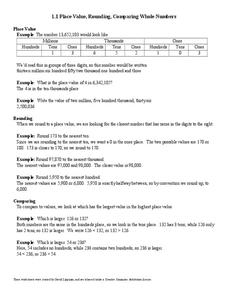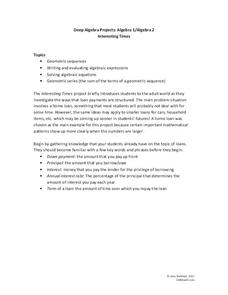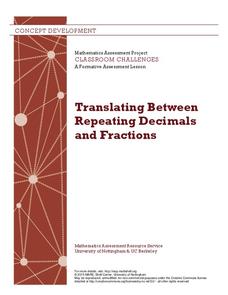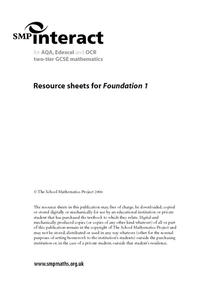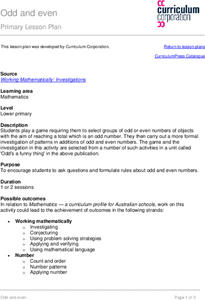Mathematics Assessment Project
College and Career Readiness Mathematics Test B1
Math was easier before it got mixed up with the alphabet. A 10-page test covers material from multiple years of high school math. Scholars demonstrate knowledge across domains with a mixture of short answer and applied problems.
EngageNY
Comparing Linear and Exponential Models Again
Making connections between a function, table, graph, and context is an essential skill in mathematics. Focused on comparing linear and exponential relationships in all these aspects, this resource equips pupils to recognize and interpret...
Mathematics Assessment Project
Middle School Mathematics Test 6
A thorough math test divides the content into two 40-minutes sections, covering material through algebra and geometry. Problems incorporate analysis and applied problem solving.
CK-12 Foundation
Direct Variation: Value of a Painting
Help your pupils find a pattern of direct variation. Young scholars use input-output pairs to find a constant of variation and then write the equation. As they build their equations, the interactive lesson provides feedback.
Howard County Schools
To Babysit or Not to Babysit?
Would you work for a penny today? Use this activity to highlight the pattern of increase in an exponential function. Scholars compare two options of being paid: one linear and one exponential. Depending on the number of days worked, they...
Open Text Book Store
Arithmetic for College Students: Worksheets
Loaded with concepts ranging from multiplying decimals to converting units to solving problems using the order of operations, a thorough practice packet is perfect for a fifth or sixth grade math classroom.
Virginia Department of Education
Angles in Polygons
Polygons — it's all about the angles. Groups work with dynamic geometry software to find the sum of the measures of the angles of various polygons. After finding the information for several polygons, the groups generate a formula that...
101 Questions
How Many Hot Dogs?
Top off your hot dogs with a little math. Learners view a video on a hot dog eating contest, and then answer questions using estimation. Using a table of hypothetical data, they create algebraic expressions to represent the situation.
5280 Math
Interesting Times
Gain a little interest in functions with a real-life task. Young scholars analyze home loan data with a geometric sequence and series. They use the models to make predictions about the total loan payments at certain intervals in a...
Concord Consortium
Broken Spreadsheet I
There is power in spreadsheet formulas and learners use this power to model quadratic data. Given a scatterplot of a parabola, pupils create formulas in a spreadsheet to populate the data. The formulas they use lead to an understanding...
Concord Consortium
Leap Years and Calendars
How many birthdays do leap year babies have in a lifetime? Learners explore the question among others in a lesson focused on different calendar systems. Given explanations of the Julian, Gregorian, and Martian calendars, individuals use...
Mathematics Assessment Project
Translating Between Repeating Decimals and Fractions
Model for your young mathematicians the process for converting repeating decimals to fractions. To demonstrate their understanding of the process, class members then complete and assessment task and participate in an activity matching...
Curated OER
Elves Number Patterns I
In this Christmas number patterns worksheet, students complete patterns in sequences of numbers to discover how many toys are made in 3 days.
Curated OER
Elves Number Patterns
In this number patterns activity, students continue patterns in number sequences to show how many toys elves will make in three days. Answers are included.
Curated OER
Complete the Patterns
In this patterns activity, students look at the each of the patterns in the 5 rows of shapes. In each row, students recognize patterns by filling in the last 2 shapes to complete the pattern in each of the 5 rows.
Curated OER
Fabulous Fractals
Students view a video to discover how patterns in nature relate to math. They explore the concept of exponential growth by observing and creating fractals. They solve and design word problems.
School Mathematics Project
Resource Sheets
This extensive and far-reaching collection of worksheets puts a new twist on many basic concepts. Learners use multiplication to trace a path from one point to another, tile a plane by converting between improper and proper fractions,...
Curated OER
Array Bingo
Students recognize patterns in arrays and repeat these patterns back to the teacher. They determine and tell the teacher the total number of squares in the array based on the pattern they recognize.
Curated OER
Count on Me
Fourth graders use inductive reasoning to find algebraic patterns in geometric figures. They use technology (i.e., calculators, computers) and manipulatives to discover number patterns involving geometric concepts. They solve concrete...
Curated OER
The Fibonacci Sequence
Students investigate a numerical pattern and look for evidence of mathematical patterns in nature. They solve puzzles and work with a partner to predict sequential numbers in a series.
Curated OER
Symmetry with Shapes
Students analyze a symmetrical stamp design with an equal balance of light and dark to create a pattern in succession. In this shape design lesson, students review concepts of sign, symbol and language across cultures. Students analyze...
Curated OER
Odd and even
Learners play a game requiring them to select groups of odd or even numbers of objects with the aim of reaching a total which is an odd number. They carry out a more formal investigation of patterns in additions of odd and even numbers.
Curated OER
Twists and Turns
Students reflect, rotate, translate, and dilate figures in the Cartesian coordinate plane using grid paper and dot paper. They use transformations (i.e., reflections, translations, rotations, and dilations) to describe geometric patterns...
Curated OER
Identifying Terms, Factors, and Coefficients
What are terms, factors, and coefficients? This slideshow provides definitions and examples of various parts of algebraic expressions, and provides guided practice problems in writing and identifying parts of algebraic expressions for...
Other popular searches
- Growing Patterns in Math
- Number Patterns in Math
- Geometric Patterns in Math
- Pasta Patterns in Math
- Increasing Patterns in Math
- Patterns in Math Quiz
- Repeating Patterns in Math
- Color Patterns in Math
- Identifying Patterns in Math
- Nature's Patterns in Math







